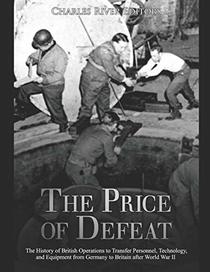This is the less-told story of what happened after the end of WWII. We have all seen the Judgement at Nuremberg movie and the films about fighting the war, but how things ended after the war is less mentioned. We all know (from the photos and films), that Europe was devastated and needed to be rebuilt. What is less known is the story of how the Nazi scientists were treated.
Most of the German scientists, especially those involved with missiles and rockets, were Nazis in name, if not in actuality. However, the US and Britain were still working on creating the nuclear bomb and wanted the German scientists to work for them. Of course, the Soviets wanted the scientists too. But by this time, the US and Britain were clear-eyed about the totalitarian ambitions of Stalin and they wanted those scientists kept away from the Soviets.
The American efforts to entice German scientists to work on US programs of rocketry, missiles, and aeronautical endeavors are well-known through Operation Paperclip. Soviets used torture, imprisonment, and threats of death to coerce scientists to work on their projects. Oddly enough, the story of how the UK transferred personnel and equipment to their country has been largely ignored by the public.
Because of the success of the Soviets in convincing the Germans to join their programs, they reached parity with the US in the early years of the Cold War. However, it was Wernher von Braun's joining the US projects that eventually brought about success in the Manhattan Project and later with NASA. Braun's brilliance helped develop the rockets that would leave the Earth's gravitational pull and go to the moon.
It was interesting to learn that many German scientists migrated prior to the second world war, to avoid the handicap of their heritage (being Jewish or other unwanted cultures/groups) or out of fear of Hitler's plans. It was surprising how many countries tried to attract German scientists after the war (India, Spain, Brazil, Argentina, etc.) to kick-start their aviation dreams. According to this book, the British were not particularly good at recruiting the scientists available after WWII. They did not understand that they were trying to attract highly sought-after scientists, who got dozens of offers. According to this book, the Soviets swept up 1600 German scientists through Operation Osoaviakhim, while the British and Americans garnered about 1000 scientists each.
This is the story of the British utilization of German scientists and intellectual property. However, as is often the case, one learns more when it is compared to other countries' successes and failures. This is very interesting. It shows that the British, through their empty pockets after the war and short-sightedness, did not get the most benefit from the German scientists they attracted to their country. However, because of their efforts, anti-German attitudes were eliminated (in their country) well before 1960.
Most of the German scientists, especially those involved with missiles and rockets, were Nazis in name, if not in actuality. However, the US and Britain were still working on creating the nuclear bomb and wanted the German scientists to work for them. Of course, the Soviets wanted the scientists too. But by this time, the US and Britain were clear-eyed about the totalitarian ambitions of Stalin and they wanted those scientists kept away from the Soviets.
The American efforts to entice German scientists to work on US programs of rocketry, missiles, and aeronautical endeavors are well-known through Operation Paperclip. Soviets used torture, imprisonment, and threats of death to coerce scientists to work on their projects. Oddly enough, the story of how the UK transferred personnel and equipment to their country has been largely ignored by the public.
Because of the success of the Soviets in convincing the Germans to join their programs, they reached parity with the US in the early years of the Cold War. However, it was Wernher von Braun's joining the US projects that eventually brought about success in the Manhattan Project and later with NASA. Braun's brilliance helped develop the rockets that would leave the Earth's gravitational pull and go to the moon.
It was interesting to learn that many German scientists migrated prior to the second world war, to avoid the handicap of their heritage (being Jewish or other unwanted cultures/groups) or out of fear of Hitler's plans. It was surprising how many countries tried to attract German scientists after the war (India, Spain, Brazil, Argentina, etc.) to kick-start their aviation dreams. According to this book, the British were not particularly good at recruiting the scientists available after WWII. They did not understand that they were trying to attract highly sought-after scientists, who got dozens of offers. According to this book, the Soviets swept up 1600 German scientists through Operation Osoaviakhim, while the British and Americans garnered about 1000 scientists each.
This is the story of the British utilization of German scientists and intellectual property. However, as is often the case, one learns more when it is compared to other countries' successes and failures. This is very interesting. It shows that the British, through their empty pockets after the war and short-sightedness, did not get the most benefit from the German scientists they attracted to their country. However, because of their efforts, anti-German attitudes were eliminated (in their country) well before 1960.




